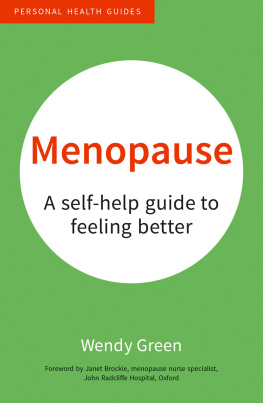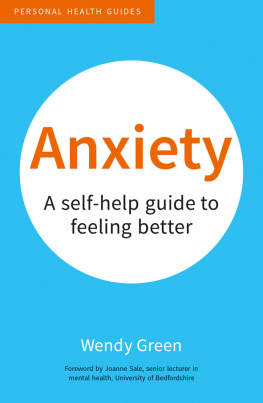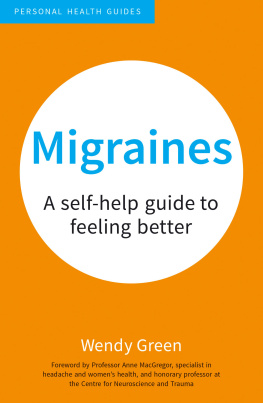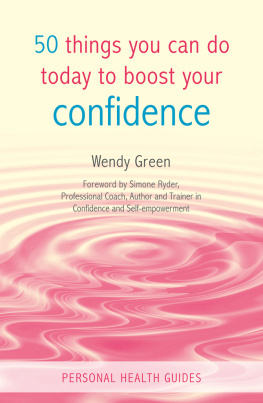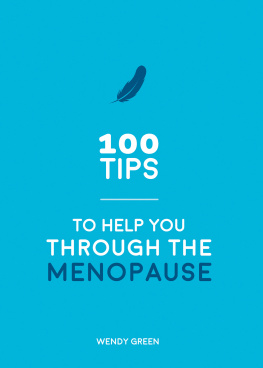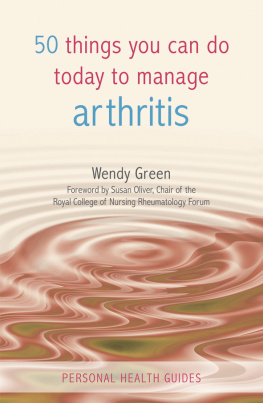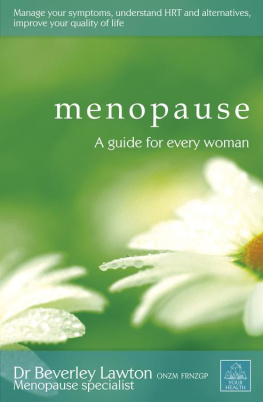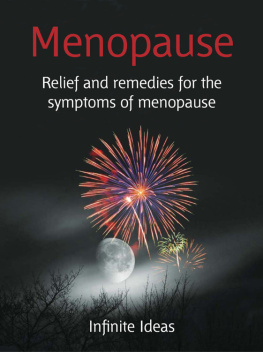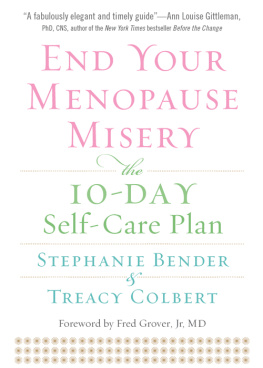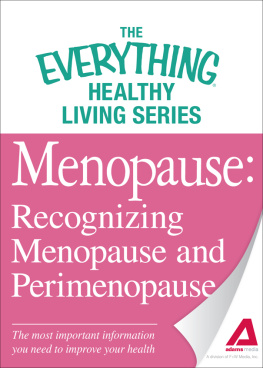MENOPAUSE: A SELF-HELP GUIDE TO FEELING BETTER
First published in 2009 as 50 Things You Can Do Today to Manage Menopause
Reprinted 2010, 2013
This edition copyright Wendy Green, 2016
All rights reserved.
No part of this book may be reproduced by any means, nor transmitted, nor translated into a machine language, without the written permission of the publishers.
Wendy Green has asserted her right to be identified as the author of this work in accordance with sections 77 and 78 of the Copyright, Designs and Patents Act 1988.
Condition of Sale
This book is sold subject to the condition that it shall not, by way of trade or otherwise, be lent, resold, hired out or otherwise circulated in any form of binding or cover other than that in which it is published and without a similar condition including this condition being imposed on the subsequent purchaser.
Vie Books is an imprint of Summersdale Publishers Ltd
Summersdale Publishers Ltd
46 West Street
Chichester
West Sussex
PO19 1RP
UK
www.summersdale.com
eISBN: 978-1-78372-742-1
Substantial discounts on bulk quantities of Summersdale books are available to corporations, professional associations and other organisations. For details contact Nicky Douglas by telephone: +44 (0) 1243 756902, fax: +44 (0) 1243 786300 or email: .
Disclaimer
Every effort has been made to ensure that the information in this book is accurate and current at the time of publication. The author and the publisher cannot accept responsibility for any misuse or misunderstanding of any information contained herein, or any loss, damage or injury, be it health, financial or otherwise, suffered by any individual or group acting upon or relying on information contained herein. None of the opinions or suggestions in this book is intended to replace medical opinion. If you have concerns about your health, please seek professional advice.
To my husband, Gordon thanks for being so supportive
Acknowledgements
Id like to thank Janet Brockie, menopause nurse specialist at the John Radcliffe Hospital, Oxford, for her expert advice particularly regarding HRT and also for her insight into the issues that can affect womens experiences of the menopause.
Id also like to thank Jennifer Barclay for commissioning the original book and Claire Plimmer for commissioning this edition. I'm also grateful to Lucy York, Laura Booth, Robert Drew and Sophie Martin for their very helpful editorial input.
Contents
Authors Note
Before I went through the menopause I had a pretty negative view of what it would be like, based on what Id read in magazines and newspapers and heard from family members, friends and acquaintances. What with feelings of loss, wrinkles, mood swings, hot flushes and broken sleep, there seemed to be little to look forward to!
However, once I learned that a gynaecological condition I had would improve after the menopause, my attitude altered and I began thinking that it could be a positive experience after all. When the menopause came I relied, and still do, on a healthy lifestyle, herbal supplements and a positive outlook to get me through it though I realise this might not be enough for every woman.
Ive found life postmenopause rewarding and exciting, though there have been some health issues to overcome including chronic migraine and arthritis. The perimenopause and postmenopause can be a bit of a roller coaster ride especially if you dont quite know what to expect, or what choices you have in dealing with it. I wrote this book to offer easily accessible information about the menopause, HRT and as many self-help options as possible, to enable readers to make sensible choices and find solutions that work for them.
Wendy Green
Foreword
In a world of inequality, the menopause unites all women regardless of race, religion, wealth or education. However, each womans experience of the menopause is individual, varied and unpredictable. Many women reach the menopause with a personal preference about which treatment options or natural approaches are acceptable for them. But we cannot know beforehand how we will feel or what we will experience.
Attitudes to the menopause vary. In the West, some authors have complained that the menopause is a natural event which has become over-medicalised; alternatively, health care professionals, like myself, may feel that some popular alternative approaches are not supported by sufficient scientific evidence. However, no one has the right to dictate what is the correct course of action for another. Each woman deserves to be able to make an informed decision on what seems correct for her. This book, with its friendly, easy-going style, offers a wide breadth of information and valuable practical advice to meet all needs. It embraces the diversity of womens experiences and responds to their differences.
However they feel about reaching the menopause, women need to be universally encouraged to make the most of this time in their lives, take responsibility for their health and move on with greater confidence to face lifes next challenge.
Janet Brockie,
menopause nurse specialist, John Radcliffe Hospital, Oxford
Introduction
What is the menopause?
The literal meaning of the word menopause is the last menstrual period, though most women use the term to refer to the years both leading up to and beyond it. The phase leading up to the menopause, when the production of female hormones begins to decline, is actually the perimenopause. The perimenopause can last three to 15 years, but averages between three to six years. The life stage after the menopause is the postmenopause. The age range for most women going through the menopause is between 45 and 55. In some rare cases it can take place as early as the thirties, or as late as 58, but the average age in the UK is 51. Generally, if the menopause occurs before the age of 45 its classed as premature, though some health professionals would define this as early and menopause before the age of 40 as premature. The age at which you go through the menopause can be inherited, so finding out when your mother had her last menstrual period could give you some idea of when to expect yours. Lifestyle factors are also thought to play a part in the age at which you experience menopause. A stressful life event can trigger early menopause, as can smoking. Other causes include cancer treatments and hysterectomy with, or occasionally without, ovary removal.
Why does it happen?
The female body has a limited supply of eggs and menopause happens when the ovaries run out of eggs and as a result stop producing the female sex hormones oestrogen and progesterone. In one sense its a non-event, because you will only know for sure that the menopause has happened when you have not had a period in a year. (Only then can you be sure that youre no longer able to get pregnant.)
What are hormones?
Hormones are basically chemical messengers which are released into the bloodstream to affect an organ elsewhere in the body. The hypothalamus at the base of the brain controls menstruation by releasing the hormone gonadotrophin to the pituitary gland. Throughout the reproductive years the pituitary responds by producing two hormones follicle-stimulating hormone (FSH) and luteinising hormone (LH). These determine the amount of oestrogen and progesterone the ovaries produce. FSH stimulates egg production and LH stimulates ovulation. As you approach menopause you ovulate less, so you can expect erratic/irregular periods until you gradually stop altogether. To compensate, your body releases more FSH and LH, to try to stimulate egg production.

